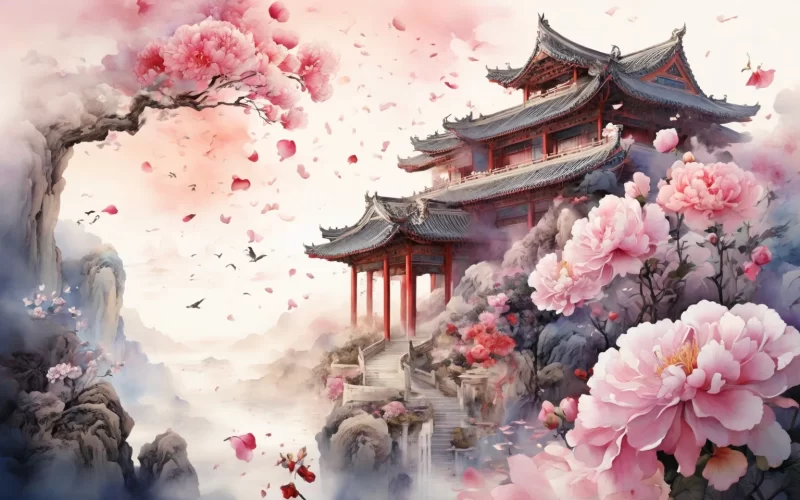You are gone. The river is high at my door.
Cicadas are mute on dew-laden boughs.
This is a moment when thoughts enter deep.
I stand alone for a long while.
...The North Star is nearer to me now than spring,
And couriers from your southland never arrive -
Yet I doubt my dream on the far horizon
That you have found another friend.
Original Poem
「凉思」
李商隐
客去波平槛,蝉休露满枝。
永怀当此节,倚立自移时。
北斗兼春远,南陵寓使迟。
天涯占梦数,疑误有新知。
Interpretation
Composed on an autumn night, this poem captures the poet's melancholic contemplation amidst chilly scenery, his thoughts swirling with longing for distant friends and reflections on his own circumstances. Autumn's inherent melancholy deepens through separation and unanswered correspondence, with "Thoughts in the cold" becoming the delicate vessel for these layered emotions.
First Couplet: "客去波平槛,蝉休露满枝。"
Kè qù bō píng kǎn, chán xiū lù mǎn zhī.
Departing guests leave ripples calming by the rail, Cicadas silenced, dew-drenched branches pale.
The poet paints stillness after farewells - summer's vivacity gone with the cicadas' song, replaced by dew-laden branches that whisper of time's passage and autumn's deepening desolation.
Second Couplet: "永怀当此节,倚立自移时。"
Yǒng huái dāng cǐ jié, yǐ lì zì yí shí.
At this season eternal thoughts arise, Leaning alone as unnoticed time flies.
Lost in remembrance, the poet stands transfixed - his vigil so absorbed that hours slip by unmarked, the very intensity of his longing stretching moments into eternity.
Third Couplet: "北斗兼春远,南陵寓使迟。"
Běidǒu jiān chūn yuǎn, Nánlíng yù shǐ chí.
The Dipper points where spring grew dim, At Nanling, messengers delay from him.
Celestial and terrestrial distance compound - the North Star marks seasons gone while southern hills await belated couriers, mapping both temporal and spatial separation from the absent friend.
Fourth Couplet: "天涯占梦数,疑误有新知。"
Tiānyá zhān mèng shù, yí wù yǒu xīn zhī.
At world's edge I divine through dreams, Fearing new bonds replace old seams.
Repeated dream interpretations betray deepening insecurity - the exile's paranoid arithmetic measuring whether friendship endures or has been supplanted, revealing loneliness's corrosive self-doubt.
Overall Appreciation
Through autumn's nocturnal tableau, the poem traces an emotional arc from longing through disappointment to paranoid speculation. Each couplet deepens the melancholy - from the immediate emptiness after parting, through temporal/spatial alienation, to friendship's imagined dissolution. The chilling scenery becomes correlative for interior desolation, making abstract grief tactile through nature's transformations.
Writing Characteristics
- Nature as Emotional Palette: Autumn's quietude (still waters, dew-heavy branches) materializes psychological states
- Crescendo of Desolation: Structural progression from absence → yearning → geographical rupture → relational uncertainty
- Astrological Symbolism: The North Star's fixed position contrasts human transience, while delayed messengers literalize broken connections
Insights
The poem anatomizes how separation breeds imagined betrayals - how distance transforms absence into narrative, then suspicion. Its enduring power lies in mapping not just seasonal melancholy, but the universal anxiety that time and space inevitably rewrite human bonds. Yet within this despair persists the counter-current of remembrance - that such painful vigilance itself testifies to connection's enduring value.
Poem translator
Kiang Kanghu
About the poet

Li Shangyin (李商隐), 813 - 858 AD, was a great poet of the late Tang Dynasty. His poems were on a par with those of Du Mu, and he was known as "Little Li Du". Li Shangyin was a native of Qinyang, Jiaozuo City, Henan Province. When he was a teenager, he lost his father at the age of nine, and was called "Zheshui East and West, half a century of wandering".












